Role of Manager and Leadership in an Organization
VerifiedAdded on 2023/04/05
|13
|3401
|79
AI Summary
This report discusses the role of manager and leadership in an organization, including their functions, theories, and models. It also explores the key approaches to operations management and the importance of operations management in achieving business objectives.
Contribute Materials
Your contribution can guide someone’s learning journey. Share your
documents today.
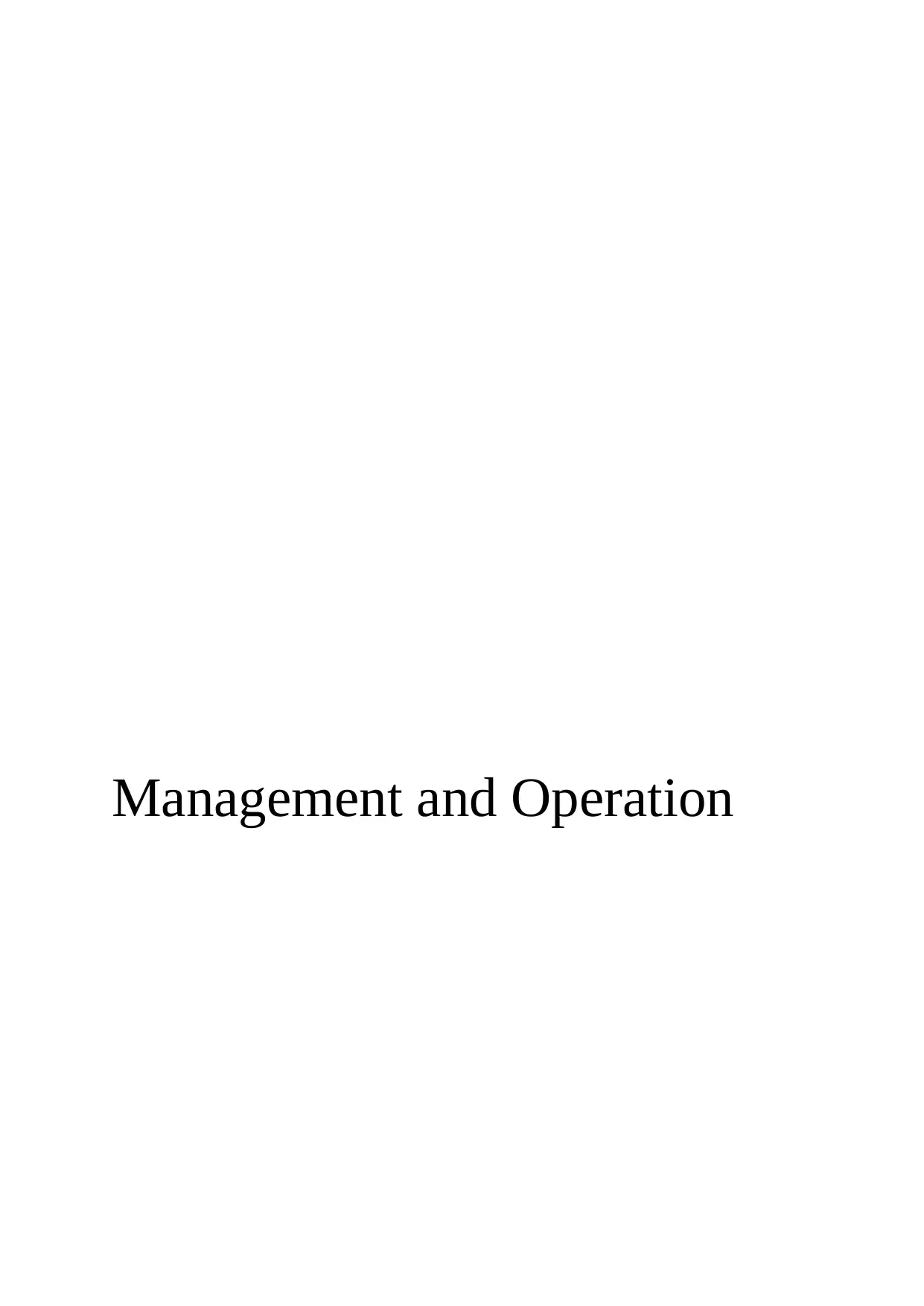
Management and Operation
Secure Best Marks with AI Grader
Need help grading? Try our AI Grader for instant feedback on your assignments.
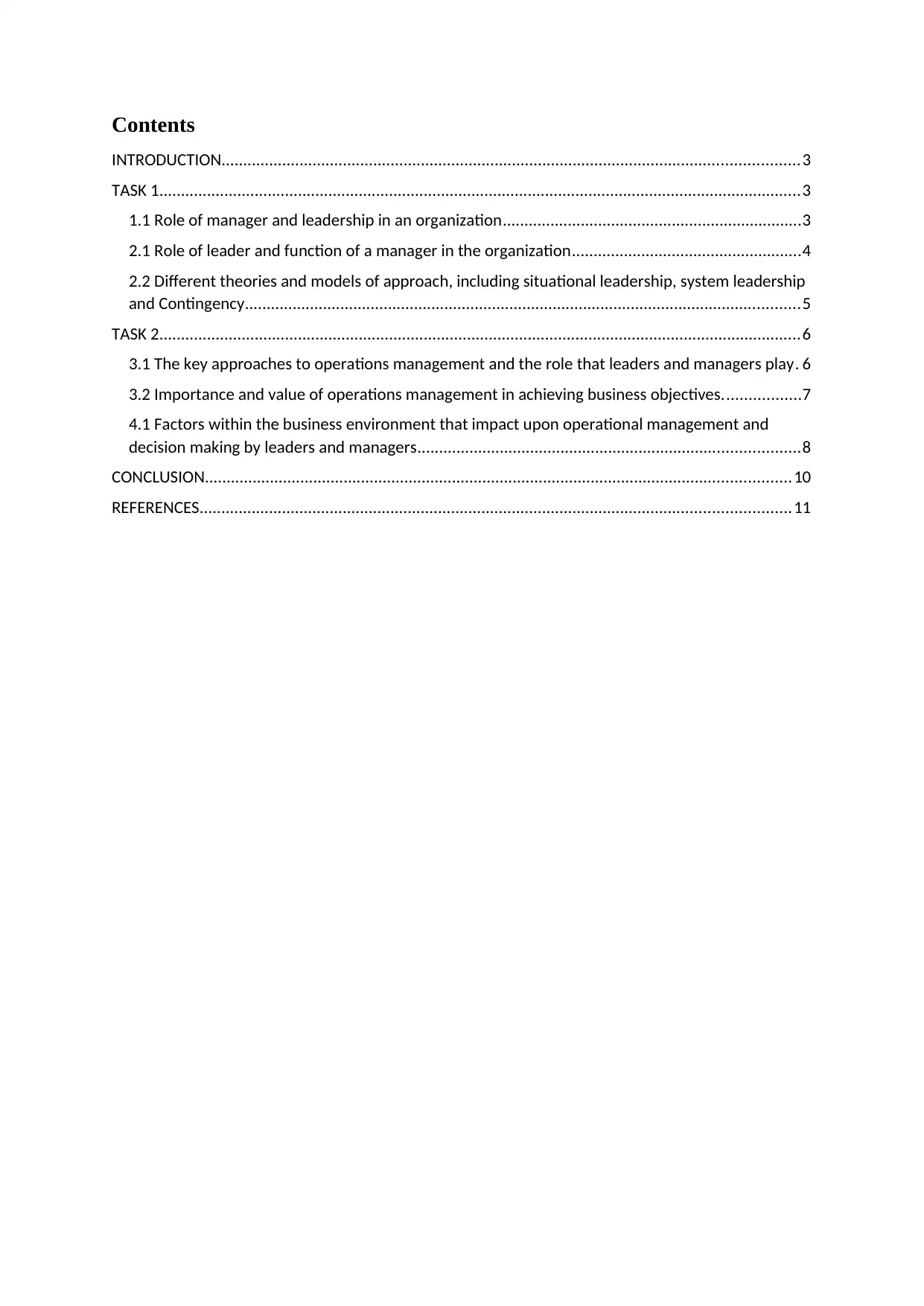
Contents
INTRODUCTION.....................................................................................................................................3
TASK 1....................................................................................................................................................3
1.1 Role of manager and leadership in an organization.....................................................................3
2.1 Role of leader and function of a manager in the organization.....................................................4
2.2 Different theories and models of approach, including situational leadership, system leadership
and Contingency................................................................................................................................5
TASK 2....................................................................................................................................................6
3.1 The key approaches to operations management and the role that leaders and managers play. 6
3.2 Importance and value of operations management in achieving business objectives..................7
4.1 Factors within the business environment that impact upon operational management and
decision making by leaders and managers........................................................................................8
CONCLUSION.......................................................................................................................................10
REFERENCES........................................................................................................................................11
INTRODUCTION.....................................................................................................................................3
TASK 1....................................................................................................................................................3
1.1 Role of manager and leadership in an organization.....................................................................3
2.1 Role of leader and function of a manager in the organization.....................................................4
2.2 Different theories and models of approach, including situational leadership, system leadership
and Contingency................................................................................................................................5
TASK 2....................................................................................................................................................6
3.1 The key approaches to operations management and the role that leaders and managers play. 6
3.2 Importance and value of operations management in achieving business objectives..................7
4.1 Factors within the business environment that impact upon operational management and
decision making by leaders and managers........................................................................................8
CONCLUSION.......................................................................................................................................10
REFERENCES........................................................................................................................................11
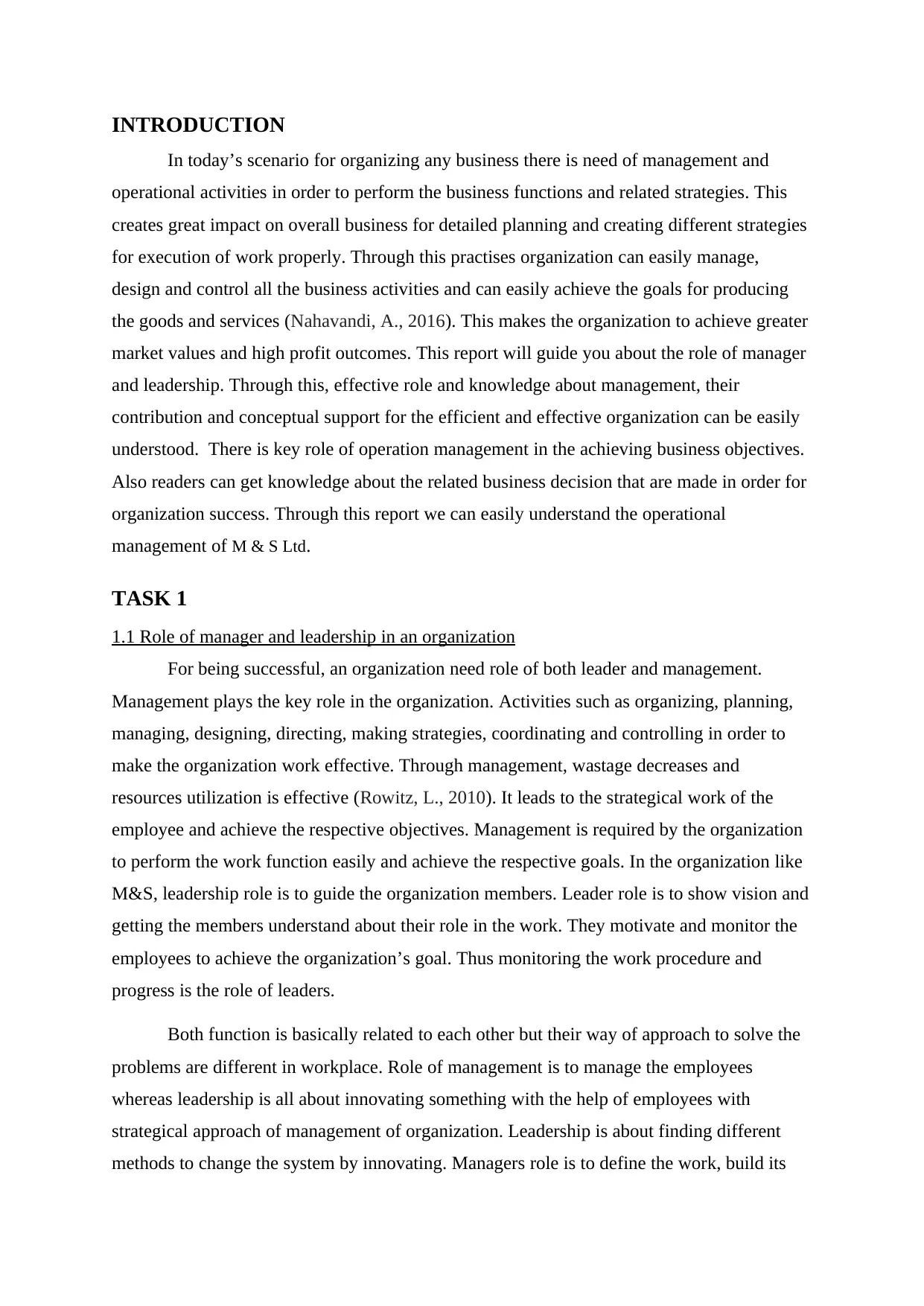
INTRODUCTION
In today’s scenario for organizing any business there is need of management and
operational activities in order to perform the business functions and related strategies. This
creates great impact on overall business for detailed planning and creating different strategies
for execution of work properly. Through this practises organization can easily manage,
design and control all the business activities and can easily achieve the goals for producing
the goods and services (Nahavandi, A., 2016). This makes the organization to achieve greater
market values and high profit outcomes. This report will guide you about the role of manager
and leadership. Through this, effective role and knowledge about management, their
contribution and conceptual support for the efficient and effective organization can be easily
understood. There is key role of operation management in the achieving business objectives.
Also readers can get knowledge about the related business decision that are made in order for
organization success. Through this report we can easily understand the operational
management of M & S Ltd.
TASK 1
1.1 Role of manager and leadership in an organization
For being successful, an organization need role of both leader and management.
Management plays the key role in the organization. Activities such as organizing, planning,
managing, designing, directing, making strategies, coordinating and controlling in order to
make the organization work effective. Through management, wastage decreases and
resources utilization is effective (Rowitz, L., 2010). It leads to the strategical work of the
employee and achieve the respective objectives. Management is required by the organization
to perform the work function easily and achieve the respective goals. In the organization like
M&S, leadership role is to guide the organization members. Leader role is to show vision and
getting the members understand about their role in the work. They motivate and monitor the
employees to achieve the organization’s goal. Thus monitoring the work procedure and
progress is the role of leaders.
Both function is basically related to each other but their way of approach to solve the
problems are different in workplace. Role of management is to manage the employees
whereas leadership is all about innovating something with the help of employees with
strategical approach of management of organization. Leadership is about finding different
methods to change the system by innovating. Managers role is to define the work, build its
In today’s scenario for organizing any business there is need of management and
operational activities in order to perform the business functions and related strategies. This
creates great impact on overall business for detailed planning and creating different strategies
for execution of work properly. Through this practises organization can easily manage,
design and control all the business activities and can easily achieve the goals for producing
the goods and services (Nahavandi, A., 2016). This makes the organization to achieve greater
market values and high profit outcomes. This report will guide you about the role of manager
and leadership. Through this, effective role and knowledge about management, their
contribution and conceptual support for the efficient and effective organization can be easily
understood. There is key role of operation management in the achieving business objectives.
Also readers can get knowledge about the related business decision that are made in order for
organization success. Through this report we can easily understand the operational
management of M & S Ltd.
TASK 1
1.1 Role of manager and leadership in an organization
For being successful, an organization need role of both leader and management.
Management plays the key role in the organization. Activities such as organizing, planning,
managing, designing, directing, making strategies, coordinating and controlling in order to
make the organization work effective. Through management, wastage decreases and
resources utilization is effective (Rowitz, L., 2010). It leads to the strategical work of the
employee and achieve the respective objectives. Management is required by the organization
to perform the work function easily and achieve the respective goals. In the organization like
M&S, leadership role is to guide the organization members. Leader role is to show vision and
getting the members understand about their role in the work. They motivate and monitor the
employees to achieve the organization’s goal. Thus monitoring the work procedure and
progress is the role of leaders.
Both function is basically related to each other but their way of approach to solve the
problems are different in workplace. Role of management is to manage the employees
whereas leadership is all about innovating something with the help of employees with
strategical approach of management of organization. Leadership is about finding different
methods to change the system by innovating. Managers role is to define the work, build its
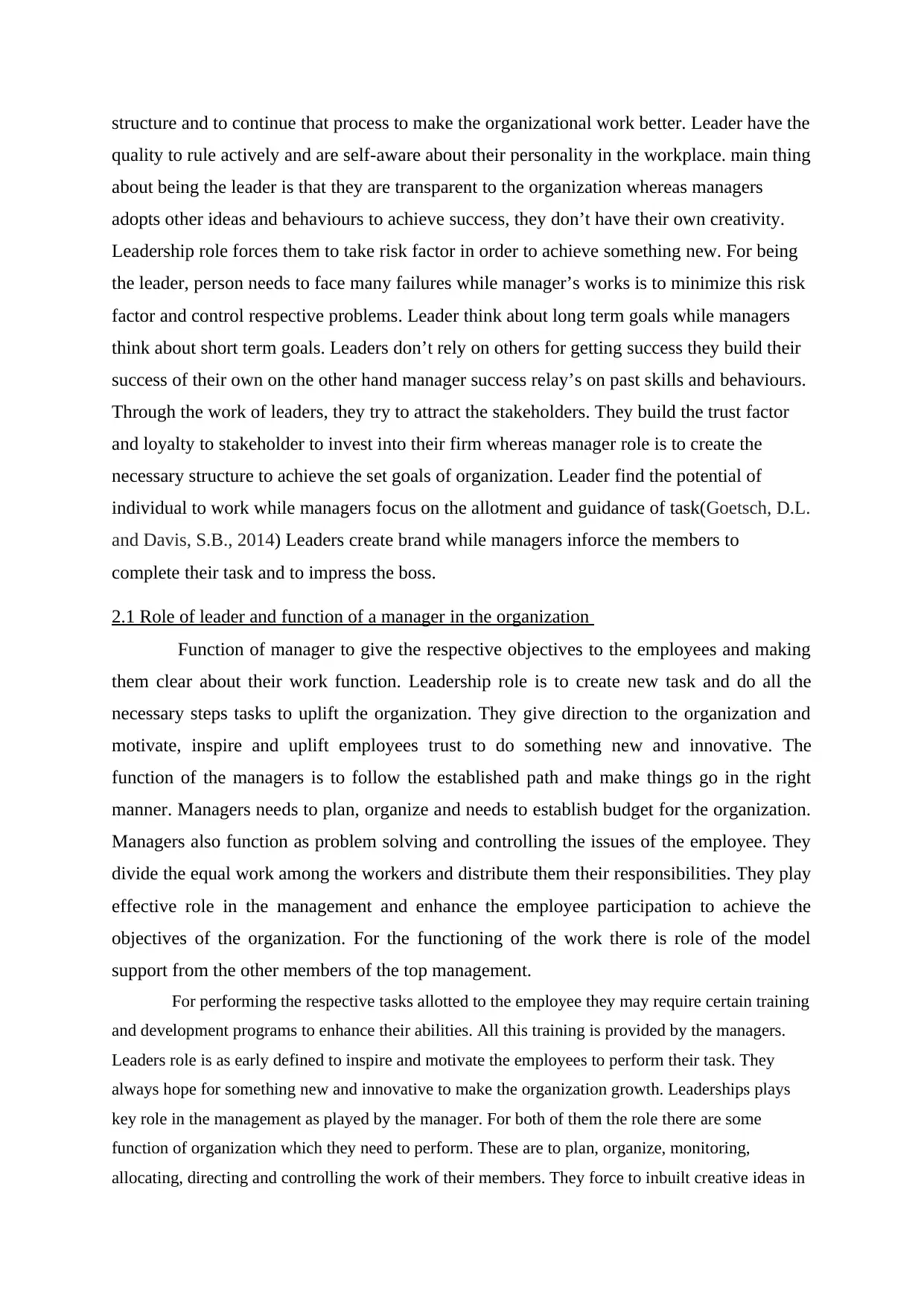
structure and to continue that process to make the organizational work better. Leader have the
quality to rule actively and are self-aware about their personality in the workplace. main thing
about being the leader is that they are transparent to the organization whereas managers
adopts other ideas and behaviours to achieve success, they don’t have their own creativity.
Leadership role forces them to take risk factor in order to achieve something new. For being
the leader, person needs to face many failures while manager’s works is to minimize this risk
factor and control respective problems. Leader think about long term goals while managers
think about short term goals. Leaders don’t rely on others for getting success they build their
success of their own on the other hand manager success relay’s on past skills and behaviours.
Through the work of leaders, they try to attract the stakeholders. They build the trust factor
and loyalty to stakeholder to invest into their firm whereas manager role is to create the
necessary structure to achieve the set goals of organization. Leader find the potential of
individual to work while managers focus on the allotment and guidance of task(Goetsch, D.L.
and Davis, S.B., 2014) Leaders create brand while managers inforce the members to
complete their task and to impress the boss.
2.1 Role of leader and function of a manager in the organization
Function of manager to give the respective objectives to the employees and making
them clear about their work function. Leadership role is to create new task and do all the
necessary steps tasks to uplift the organization. They give direction to the organization and
motivate, inspire and uplift employees trust to do something new and innovative. The
function of the managers is to follow the established path and make things go in the right
manner. Managers needs to plan, organize and needs to establish budget for the organization.
Managers also function as problem solving and controlling the issues of the employee. They
divide the equal work among the workers and distribute them their responsibilities. They play
effective role in the management and enhance the employee participation to achieve the
objectives of the organization. For the functioning of the work there is role of the model
support from the other members of the top management.
For performing the respective tasks allotted to the employee they may require certain training
and development programs to enhance their abilities. All this training is provided by the managers.
Leaders role is as early defined to inspire and motivate the employees to perform their task. They
always hope for something new and innovative to make the organization growth. Leaderships plays
key role in the management as played by the manager. For both of them the role there are some
function of organization which they need to perform. These are to plan, organize, monitoring,
allocating, directing and controlling the work of their members. They force to inbuilt creative ideas in
quality to rule actively and are self-aware about their personality in the workplace. main thing
about being the leader is that they are transparent to the organization whereas managers
adopts other ideas and behaviours to achieve success, they don’t have their own creativity.
Leadership role forces them to take risk factor in order to achieve something new. For being
the leader, person needs to face many failures while manager’s works is to minimize this risk
factor and control respective problems. Leader think about long term goals while managers
think about short term goals. Leaders don’t rely on others for getting success they build their
success of their own on the other hand manager success relay’s on past skills and behaviours.
Through the work of leaders, they try to attract the stakeholders. They build the trust factor
and loyalty to stakeholder to invest into their firm whereas manager role is to create the
necessary structure to achieve the set goals of organization. Leader find the potential of
individual to work while managers focus on the allotment and guidance of task(Goetsch, D.L.
and Davis, S.B., 2014) Leaders create brand while managers inforce the members to
complete their task and to impress the boss.
2.1 Role of leader and function of a manager in the organization
Function of manager to give the respective objectives to the employees and making
them clear about their work function. Leadership role is to create new task and do all the
necessary steps tasks to uplift the organization. They give direction to the organization and
motivate, inspire and uplift employees trust to do something new and innovative. The
function of the managers is to follow the established path and make things go in the right
manner. Managers needs to plan, organize and needs to establish budget for the organization.
Managers also function as problem solving and controlling the issues of the employee. They
divide the equal work among the workers and distribute them their responsibilities. They play
effective role in the management and enhance the employee participation to achieve the
objectives of the organization. For the functioning of the work there is role of the model
support from the other members of the top management.
For performing the respective tasks allotted to the employee they may require certain training
and development programs to enhance their abilities. All this training is provided by the managers.
Leaders role is as early defined to inspire and motivate the employees to perform their task. They
always hope for something new and innovative to make the organization growth. Leaderships plays
key role in the management as played by the manager. For both of them the role there are some
function of organization which they need to perform. These are to plan, organize, monitoring,
allocating, directing and controlling the work of their members. They force to inbuilt creative ideas in
Paraphrase This Document
Need a fresh take? Get an instant paraphrase of this document with our AI Paraphraser
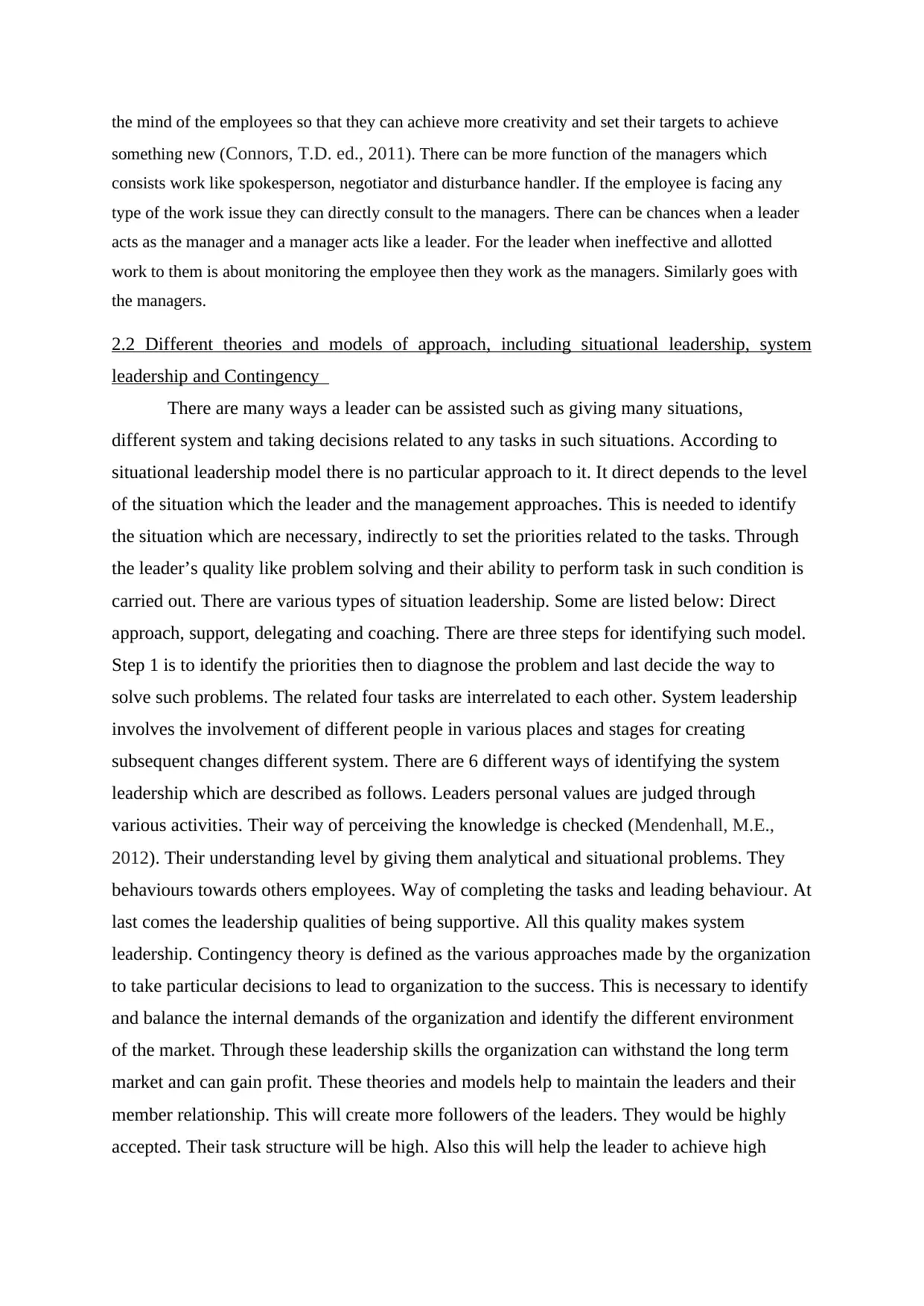
the mind of the employees so that they can achieve more creativity and set their targets to achieve
something new (Connors, T.D. ed., 2011). There can be more function of the managers which
consists work like spokesperson, negotiator and disturbance handler. If the employee is facing any
type of the work issue they can directly consult to the managers. There can be chances when a leader
acts as the manager and a manager acts like a leader. For the leader when ineffective and allotted
work to them is about monitoring the employee then they work as the managers. Similarly goes with
the managers.
2.2 Different theories and models of approach, including situational leadership, system
leadership and Contingency
There are many ways a leader can be assisted such as giving many situations,
different system and taking decisions related to any tasks in such situations. According to
situational leadership model there is no particular approach to it. It direct depends to the level
of the situation which the leader and the management approaches. This is needed to identify
the situation which are necessary, indirectly to set the priorities related to the tasks. Through
the leader’s quality like problem solving and their ability to perform task in such condition is
carried out. There are various types of situation leadership. Some are listed below: Direct
approach, support, delegating and coaching. There are three steps for identifying such model.
Step 1 is to identify the priorities then to diagnose the problem and last decide the way to
solve such problems. The related four tasks are interrelated to each other. System leadership
involves the involvement of different people in various places and stages for creating
subsequent changes different system. There are 6 different ways of identifying the system
leadership which are described as follows. Leaders personal values are judged through
various activities. Their way of perceiving the knowledge is checked (Mendenhall, M.E.,
2012). Their understanding level by giving them analytical and situational problems. They
behaviours towards others employees. Way of completing the tasks and leading behaviour. At
last comes the leadership qualities of being supportive. All this quality makes system
leadership. Contingency theory is defined as the various approaches made by the organization
to take particular decisions to lead to organization to the success. This is necessary to identify
and balance the internal demands of the organization and identify the different environment
of the market. Through these leadership skills the organization can withstand the long term
market and can gain profit. These theories and models help to maintain the leaders and their
member relationship. This will create more followers of the leaders. They would be highly
accepted. Their task structure will be high. Also this will help the leader to achieve high
something new (Connors, T.D. ed., 2011). There can be more function of the managers which
consists work like spokesperson, negotiator and disturbance handler. If the employee is facing any
type of the work issue they can directly consult to the managers. There can be chances when a leader
acts as the manager and a manager acts like a leader. For the leader when ineffective and allotted
work to them is about monitoring the employee then they work as the managers. Similarly goes with
the managers.
2.2 Different theories and models of approach, including situational leadership, system
leadership and Contingency
There are many ways a leader can be assisted such as giving many situations,
different system and taking decisions related to any tasks in such situations. According to
situational leadership model there is no particular approach to it. It direct depends to the level
of the situation which the leader and the management approaches. This is needed to identify
the situation which are necessary, indirectly to set the priorities related to the tasks. Through
the leader’s quality like problem solving and their ability to perform task in such condition is
carried out. There are various types of situation leadership. Some are listed below: Direct
approach, support, delegating and coaching. There are three steps for identifying such model.
Step 1 is to identify the priorities then to diagnose the problem and last decide the way to
solve such problems. The related four tasks are interrelated to each other. System leadership
involves the involvement of different people in various places and stages for creating
subsequent changes different system. There are 6 different ways of identifying the system
leadership which are described as follows. Leaders personal values are judged through
various activities. Their way of perceiving the knowledge is checked (Mendenhall, M.E.,
2012). Their understanding level by giving them analytical and situational problems. They
behaviours towards others employees. Way of completing the tasks and leading behaviour. At
last comes the leadership qualities of being supportive. All this quality makes system
leadership. Contingency theory is defined as the various approaches made by the organization
to take particular decisions to lead to organization to the success. This is necessary to identify
and balance the internal demands of the organization and identify the different environment
of the market. Through these leadership skills the organization can withstand the long term
market and can gain profit. These theories and models help to maintain the leaders and their
member relationship. This will create more followers of the leaders. They would be highly
accepted. Their task structure will be high. Also this will help the leader to achieve high
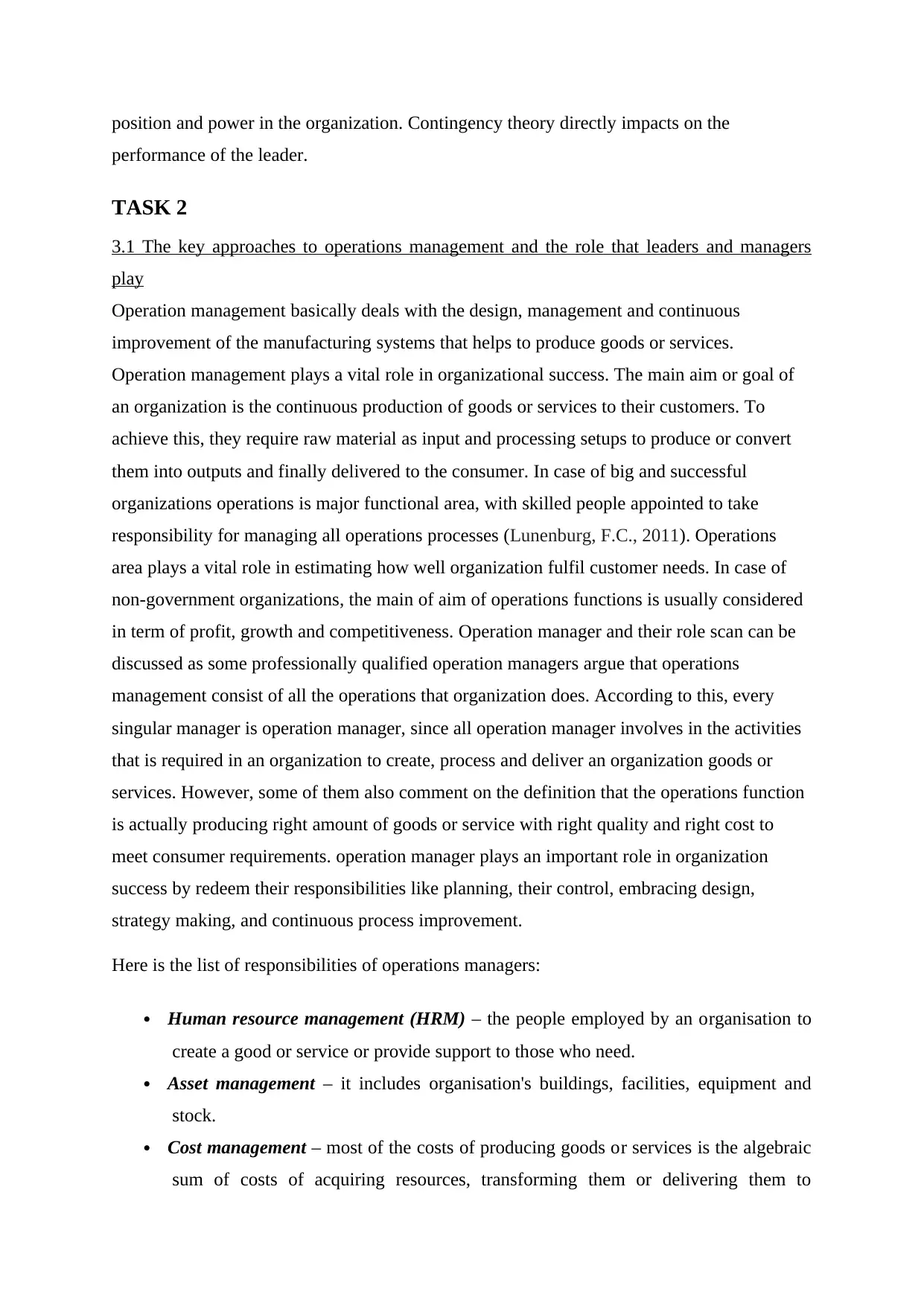
position and power in the organization. Contingency theory directly impacts on the
performance of the leader.
TASK 2
3.1 The key approaches to operations management and the role that leaders and managers
play
Operation management basically deals with the design, management and continuous
improvement of the manufacturing systems that helps to produce goods or services.
Operation management plays a vital role in organizational success. The main aim or goal of
an organization is the continuous production of goods or services to their customers. To
achieve this, they require raw material as input and processing setups to produce or convert
them into outputs and finally delivered to the consumer. In case of big and successful
organizations operations is major functional area, with skilled people appointed to take
responsibility for managing all operations processes (Lunenburg, F.C., 2011). Operations
area plays a vital role in estimating how well organization fulfil customer needs. In case of
non-government organizations, the main of aim of operations functions is usually considered
in term of profit, growth and competitiveness. Operation manager and their role scan can be
discussed as some professionally qualified operation managers argue that operations
management consist of all the operations that organization does. According to this, every
singular manager is operation manager, since all operation manager involves in the activities
that is required in an organization to create, process and deliver an organization goods or
services. However, some of them also comment on the definition that the operations function
is actually producing right amount of goods or service with right quality and right cost to
meet consumer requirements. operation manager plays an important role in organization
success by redeem their responsibilities like planning, their control, embracing design,
strategy making, and continuous process improvement.
Here is the list of responsibilities of operations managers:
Human resource management (HRM) – the people employed by an organisation to
create a good or service or provide support to those who need.
Asset management – it includes organisation's buildings, facilities, equipment and
stock.
Cost management – most of the costs of producing goods or services is the algebraic
sum of costs of acquiring resources, transforming them or delivering them to
performance of the leader.
TASK 2
3.1 The key approaches to operations management and the role that leaders and managers
play
Operation management basically deals with the design, management and continuous
improvement of the manufacturing systems that helps to produce goods or services.
Operation management plays a vital role in organizational success. The main aim or goal of
an organization is the continuous production of goods or services to their customers. To
achieve this, they require raw material as input and processing setups to produce or convert
them into outputs and finally delivered to the consumer. In case of big and successful
organizations operations is major functional area, with skilled people appointed to take
responsibility for managing all operations processes (Lunenburg, F.C., 2011). Operations
area plays a vital role in estimating how well organization fulfil customer needs. In case of
non-government organizations, the main of aim of operations functions is usually considered
in term of profit, growth and competitiveness. Operation manager and their role scan can be
discussed as some professionally qualified operation managers argue that operations
management consist of all the operations that organization does. According to this, every
singular manager is operation manager, since all operation manager involves in the activities
that is required in an organization to create, process and deliver an organization goods or
services. However, some of them also comment on the definition that the operations function
is actually producing right amount of goods or service with right quality and right cost to
meet consumer requirements. operation manager plays an important role in organization
success by redeem their responsibilities like planning, their control, embracing design,
strategy making, and continuous process improvement.
Here is the list of responsibilities of operations managers:
Human resource management (HRM) – the people employed by an organisation to
create a good or service or provide support to those who need.
Asset management – it includes organisation's buildings, facilities, equipment and
stock.
Cost management – most of the costs of producing goods or services is the algebraic
sum of costs of acquiring resources, transforming them or delivering them to
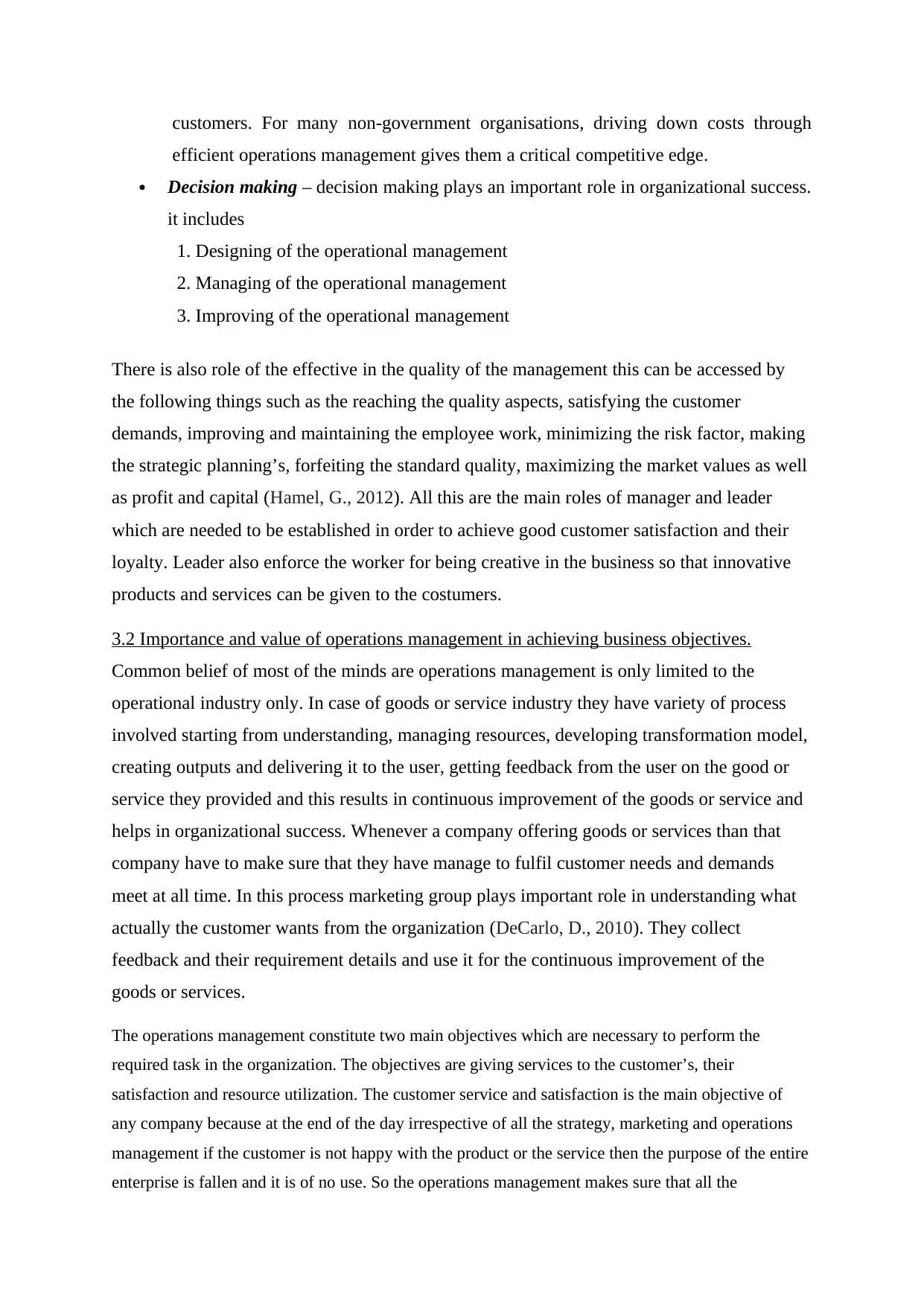
customers. For many non-government organisations, driving down costs through
efficient operations management gives them a critical competitive edge.
Decision making – decision making plays an important role in organizational success.
it includes
1. Designing of the operational management
2. Managing of the operational management
3. Improving of the operational management
There is also role of the effective in the quality of the management this can be accessed by
the following things such as the reaching the quality aspects, satisfying the customer
demands, improving and maintaining the employee work, minimizing the risk factor, making
the strategic planning’s, forfeiting the standard quality, maximizing the market values as well
as profit and capital (Hamel, G., 2012). All this are the main roles of manager and leader
which are needed to be established in order to achieve good customer satisfaction and their
loyalty. Leader also enforce the worker for being creative in the business so that innovative
products and services can be given to the costumers.
3.2 Importance and value of operations management in achieving business objectives.
Common belief of most of the minds are operations management is only limited to the
operational industry only. In case of goods or service industry they have variety of process
involved starting from understanding, managing resources, developing transformation model,
creating outputs and delivering it to the user, getting feedback from the user on the good or
service they provided and this results in continuous improvement of the goods or service and
helps in organizational success. Whenever a company offering goods or services than that
company have to make sure that they have manage to fulfil customer needs and demands
meet at all time. In this process marketing group plays important role in understanding what
actually the customer wants from the organization (DeCarlo, D., 2010). They collect
feedback and their requirement details and use it for the continuous improvement of the
goods or services.
The operations management constitute two main objectives which are necessary to perform the
required task in the organization. The objectives are giving services to the customer’s, their
satisfaction and resource utilization. The customer service and satisfaction is the main objective of
any company because at the end of the day irrespective of all the strategy, marketing and operations
management if the customer is not happy with the product or the service then the purpose of the entire
enterprise is fallen and it is of no use. So the operations management makes sure that all the
efficient operations management gives them a critical competitive edge.
Decision making – decision making plays an important role in organizational success.
it includes
1. Designing of the operational management
2. Managing of the operational management
3. Improving of the operational management
There is also role of the effective in the quality of the management this can be accessed by
the following things such as the reaching the quality aspects, satisfying the customer
demands, improving and maintaining the employee work, minimizing the risk factor, making
the strategic planning’s, forfeiting the standard quality, maximizing the market values as well
as profit and capital (Hamel, G., 2012). All this are the main roles of manager and leader
which are needed to be established in order to achieve good customer satisfaction and their
loyalty. Leader also enforce the worker for being creative in the business so that innovative
products and services can be given to the costumers.
3.2 Importance and value of operations management in achieving business objectives.
Common belief of most of the minds are operations management is only limited to the
operational industry only. In case of goods or service industry they have variety of process
involved starting from understanding, managing resources, developing transformation model,
creating outputs and delivering it to the user, getting feedback from the user on the good or
service they provided and this results in continuous improvement of the goods or service and
helps in organizational success. Whenever a company offering goods or services than that
company have to make sure that they have manage to fulfil customer needs and demands
meet at all time. In this process marketing group plays important role in understanding what
actually the customer wants from the organization (DeCarlo, D., 2010). They collect
feedback and their requirement details and use it for the continuous improvement of the
goods or services.
The operations management constitute two main objectives which are necessary to perform the
required task in the organization. The objectives are giving services to the customer’s, their
satisfaction and resource utilization. The customer service and satisfaction is the main objective of
any company because at the end of the day irrespective of all the strategy, marketing and operations
management if the customer is not happy with the product or the service then the purpose of the entire
enterprise is fallen and it is of no use. So the operations management makes sure that all the
Secure Best Marks with AI Grader
Need help grading? Try our AI Grader for instant feedback on your assignments.
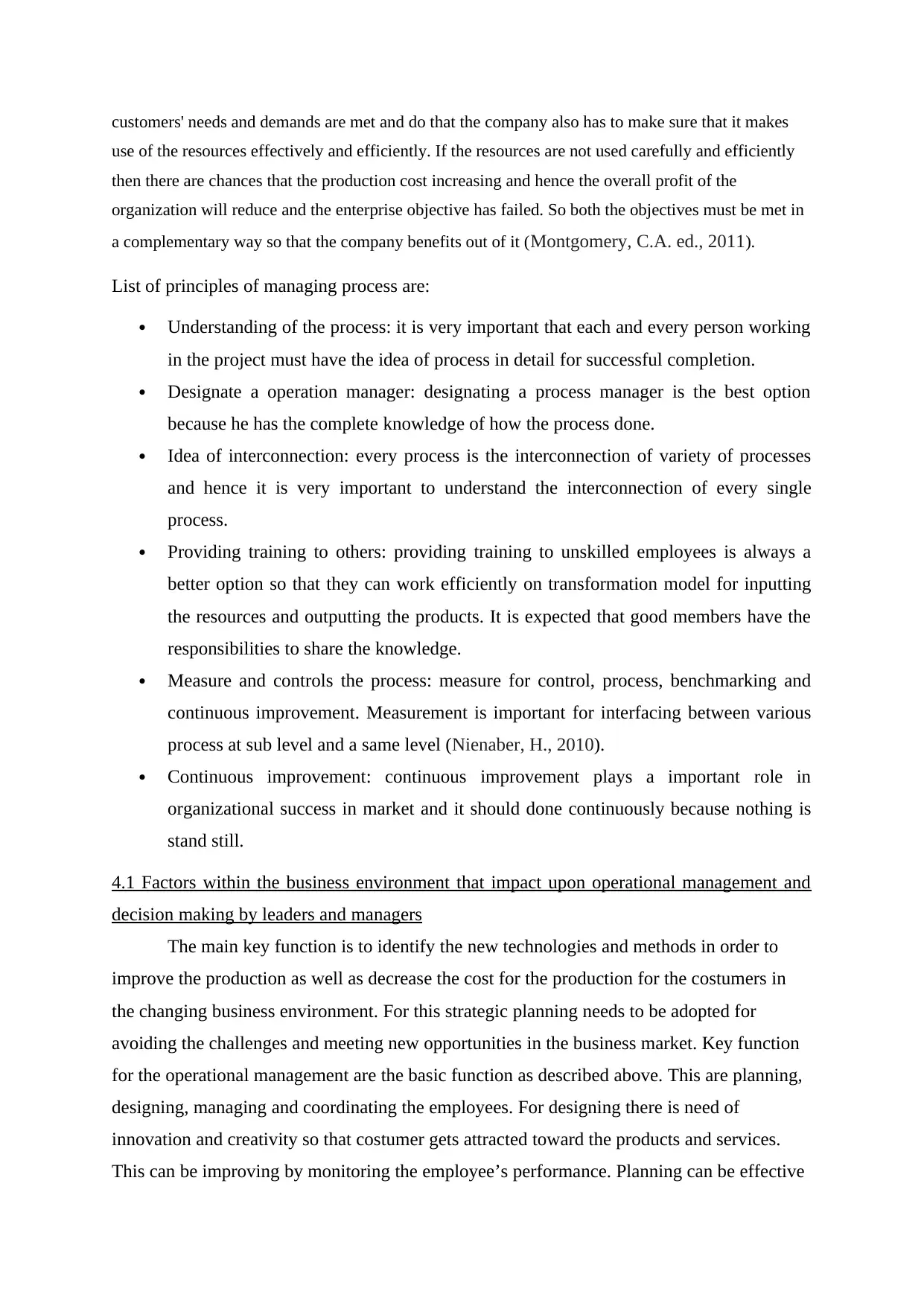
customers' needs and demands are met and do that the company also has to make sure that it makes
use of the resources effectively and efficiently. If the resources are not used carefully and efficiently
then there are chances that the production cost increasing and hence the overall profit of the
organization will reduce and the enterprise objective has failed. So both the objectives must be met in
a complementary way so that the company benefits out of it (Montgomery, C.A. ed., 2011).
List of principles of managing process are:
Understanding of the process: it is very important that each and every person working
in the project must have the idea of process in detail for successful completion.
Designate a operation manager: designating a process manager is the best option
because he has the complete knowledge of how the process done.
Idea of interconnection: every process is the interconnection of variety of processes
and hence it is very important to understand the interconnection of every single
process.
Providing training to others: providing training to unskilled employees is always a
better option so that they can work efficiently on transformation model for inputting
the resources and outputting the products. It is expected that good members have the
responsibilities to share the knowledge.
Measure and controls the process: measure for control, process, benchmarking and
continuous improvement. Measurement is important for interfacing between various
process at sub level and a same level (Nienaber, H., 2010).
Continuous improvement: continuous improvement plays a important role in
organizational success in market and it should done continuously because nothing is
stand still.
4.1 Factors within the business environment that impact upon operational management and
decision making by leaders and managers
The main key function is to identify the new technologies and methods in order to
improve the production as well as decrease the cost for the production for the costumers in
the changing business environment. For this strategic planning needs to be adopted for
avoiding the challenges and meeting new opportunities in the business market. Key function
for the operational management are the basic function as described above. This are planning,
designing, managing and coordinating the employees. For designing there is need of
innovation and creativity so that costumer gets attracted toward the products and services.
This can be improving by monitoring the employee’s performance. Planning can be effective
use of the resources effectively and efficiently. If the resources are not used carefully and efficiently
then there are chances that the production cost increasing and hence the overall profit of the
organization will reduce and the enterprise objective has failed. So both the objectives must be met in
a complementary way so that the company benefits out of it (Montgomery, C.A. ed., 2011).
List of principles of managing process are:
Understanding of the process: it is very important that each and every person working
in the project must have the idea of process in detail for successful completion.
Designate a operation manager: designating a process manager is the best option
because he has the complete knowledge of how the process done.
Idea of interconnection: every process is the interconnection of variety of processes
and hence it is very important to understand the interconnection of every single
process.
Providing training to others: providing training to unskilled employees is always a
better option so that they can work efficiently on transformation model for inputting
the resources and outputting the products. It is expected that good members have the
responsibilities to share the knowledge.
Measure and controls the process: measure for control, process, benchmarking and
continuous improvement. Measurement is important for interfacing between various
process at sub level and a same level (Nienaber, H., 2010).
Continuous improvement: continuous improvement plays a important role in
organizational success in market and it should done continuously because nothing is
stand still.
4.1 Factors within the business environment that impact upon operational management and
decision making by leaders and managers
The main key function is to identify the new technologies and methods in order to
improve the production as well as decrease the cost for the production for the costumers in
the changing business environment. For this strategic planning needs to be adopted for
avoiding the challenges and meeting new opportunities in the business market. Key function
for the operational management are the basic function as described above. This are planning,
designing, managing and coordinating the employees. For designing there is need of
innovation and creativity so that costumer gets attracted toward the products and services.
This can be improving by monitoring the employee’s performance. Planning can be effective
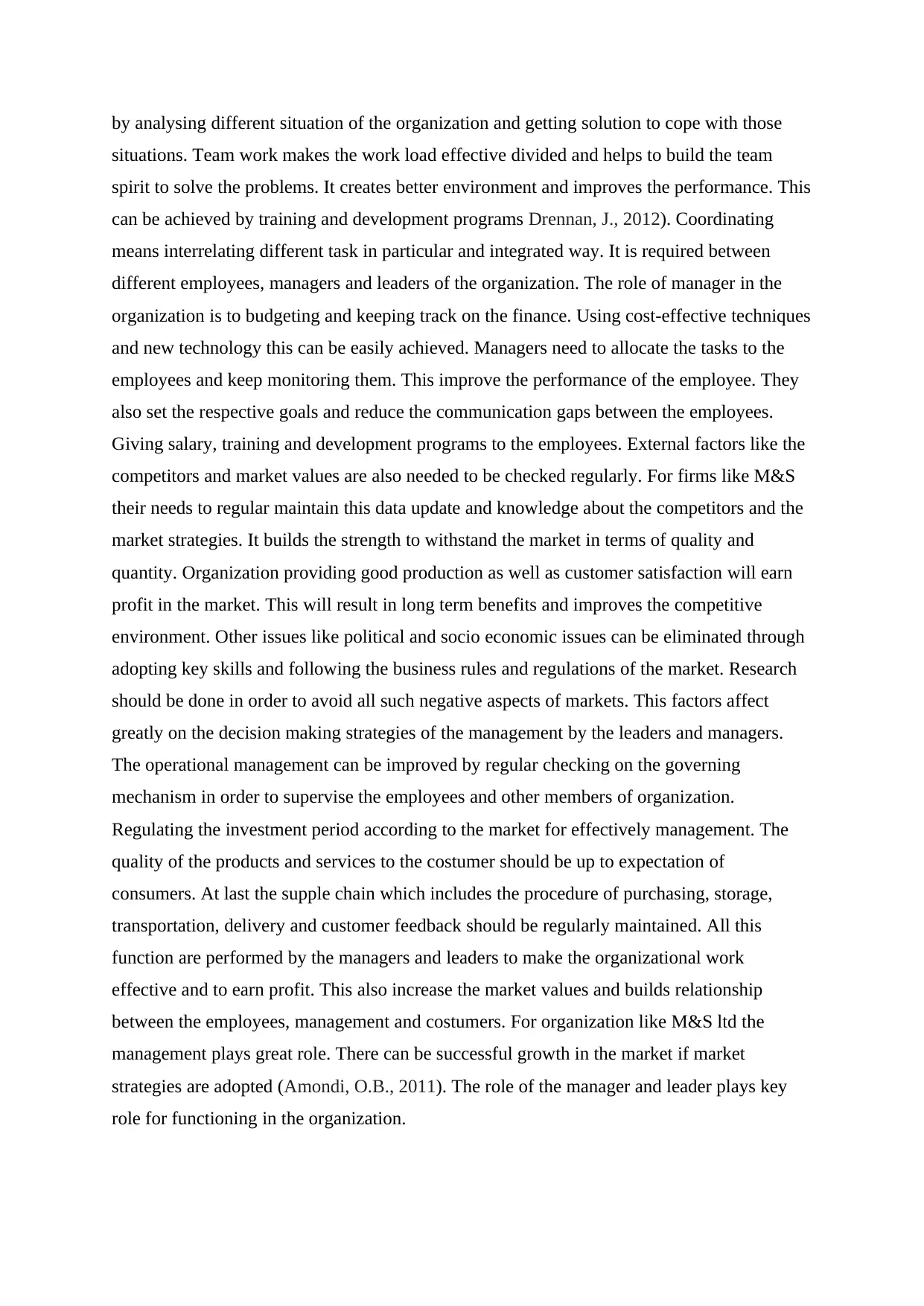
by analysing different situation of the organization and getting solution to cope with those
situations. Team work makes the work load effective divided and helps to build the team
spirit to solve the problems. It creates better environment and improves the performance. This
can be achieved by training and development programs Drennan, J., 2012). Coordinating
means interrelating different task in particular and integrated way. It is required between
different employees, managers and leaders of the organization. The role of manager in the
organization is to budgeting and keeping track on the finance. Using cost-effective techniques
and new technology this can be easily achieved. Managers need to allocate the tasks to the
employees and keep monitoring them. This improve the performance of the employee. They
also set the respective goals and reduce the communication gaps between the employees.
Giving salary, training and development programs to the employees. External factors like the
competitors and market values are also needed to be checked regularly. For firms like M&S
their needs to regular maintain this data update and knowledge about the competitors and the
market strategies. It builds the strength to withstand the market in terms of quality and
quantity. Organization providing good production as well as customer satisfaction will earn
profit in the market. This will result in long term benefits and improves the competitive
environment. Other issues like political and socio economic issues can be eliminated through
adopting key skills and following the business rules and regulations of the market. Research
should be done in order to avoid all such negative aspects of markets. This factors affect
greatly on the decision making strategies of the management by the leaders and managers.
The operational management can be improved by regular checking on the governing
mechanism in order to supervise the employees and other members of organization.
Regulating the investment period according to the market for effectively management. The
quality of the products and services to the costumer should be up to expectation of
consumers. At last the supple chain which includes the procedure of purchasing, storage,
transportation, delivery and customer feedback should be regularly maintained. All this
function are performed by the managers and leaders to make the organizational work
effective and to earn profit. This also increase the market values and builds relationship
between the employees, management and costumers. For organization like M&S ltd the
management plays great role. There can be successful growth in the market if market
strategies are adopted (Amondi, O.B., 2011). The role of the manager and leader plays key
role for functioning in the organization.
situations. Team work makes the work load effective divided and helps to build the team
spirit to solve the problems. It creates better environment and improves the performance. This
can be achieved by training and development programs Drennan, J., 2012). Coordinating
means interrelating different task in particular and integrated way. It is required between
different employees, managers and leaders of the organization. The role of manager in the
organization is to budgeting and keeping track on the finance. Using cost-effective techniques
and new technology this can be easily achieved. Managers need to allocate the tasks to the
employees and keep monitoring them. This improve the performance of the employee. They
also set the respective goals and reduce the communication gaps between the employees.
Giving salary, training and development programs to the employees. External factors like the
competitors and market values are also needed to be checked regularly. For firms like M&S
their needs to regular maintain this data update and knowledge about the competitors and the
market strategies. It builds the strength to withstand the market in terms of quality and
quantity. Organization providing good production as well as customer satisfaction will earn
profit in the market. This will result in long term benefits and improves the competitive
environment. Other issues like political and socio economic issues can be eliminated through
adopting key skills and following the business rules and regulations of the market. Research
should be done in order to avoid all such negative aspects of markets. This factors affect
greatly on the decision making strategies of the management by the leaders and managers.
The operational management can be improved by regular checking on the governing
mechanism in order to supervise the employees and other members of organization.
Regulating the investment period according to the market for effectively management. The
quality of the products and services to the costumer should be up to expectation of
consumers. At last the supple chain which includes the procedure of purchasing, storage,
transportation, delivery and customer feedback should be regularly maintained. All this
function are performed by the managers and leaders to make the organizational work
effective and to earn profit. This also increase the market values and builds relationship
between the employees, management and costumers. For organization like M&S ltd the
management plays great role. There can be successful growth in the market if market
strategies are adopted (Amondi, O.B., 2011). The role of the manager and leader plays key
role for functioning in the organization.
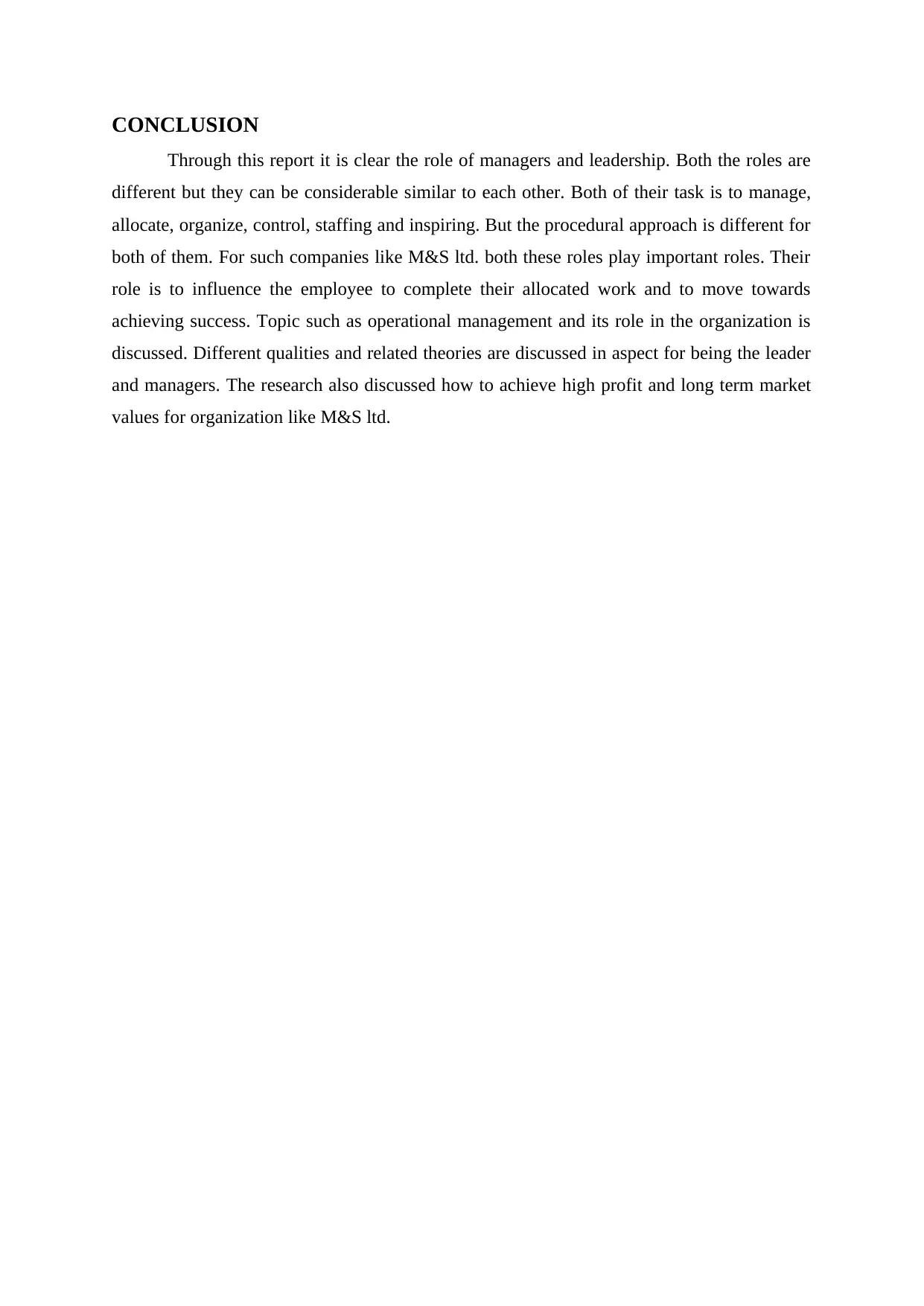
CONCLUSION
Through this report it is clear the role of managers and leadership. Both the roles are
different but they can be considerable similar to each other. Both of their task is to manage,
allocate, organize, control, staffing and inspiring. But the procedural approach is different for
both of them. For such companies like M&S ltd. both these roles play important roles. Their
role is to influence the employee to complete their allocated work and to move towards
achieving success. Topic such as operational management and its role in the organization is
discussed. Different qualities and related theories are discussed in aspect for being the leader
and managers. The research also discussed how to achieve high profit and long term market
values for organization like M&S ltd.
Through this report it is clear the role of managers and leadership. Both the roles are
different but they can be considerable similar to each other. Both of their task is to manage,
allocate, organize, control, staffing and inspiring. But the procedural approach is different for
both of them. For such companies like M&S ltd. both these roles play important roles. Their
role is to influence the employee to complete their allocated work and to move towards
achieving success. Topic such as operational management and its role in the organization is
discussed. Different qualities and related theories are discussed in aspect for being the leader
and managers. The research also discussed how to achieve high profit and long term market
values for organization like M&S ltd.
Paraphrase This Document
Need a fresh take? Get an instant paraphrase of this document with our AI Paraphraser
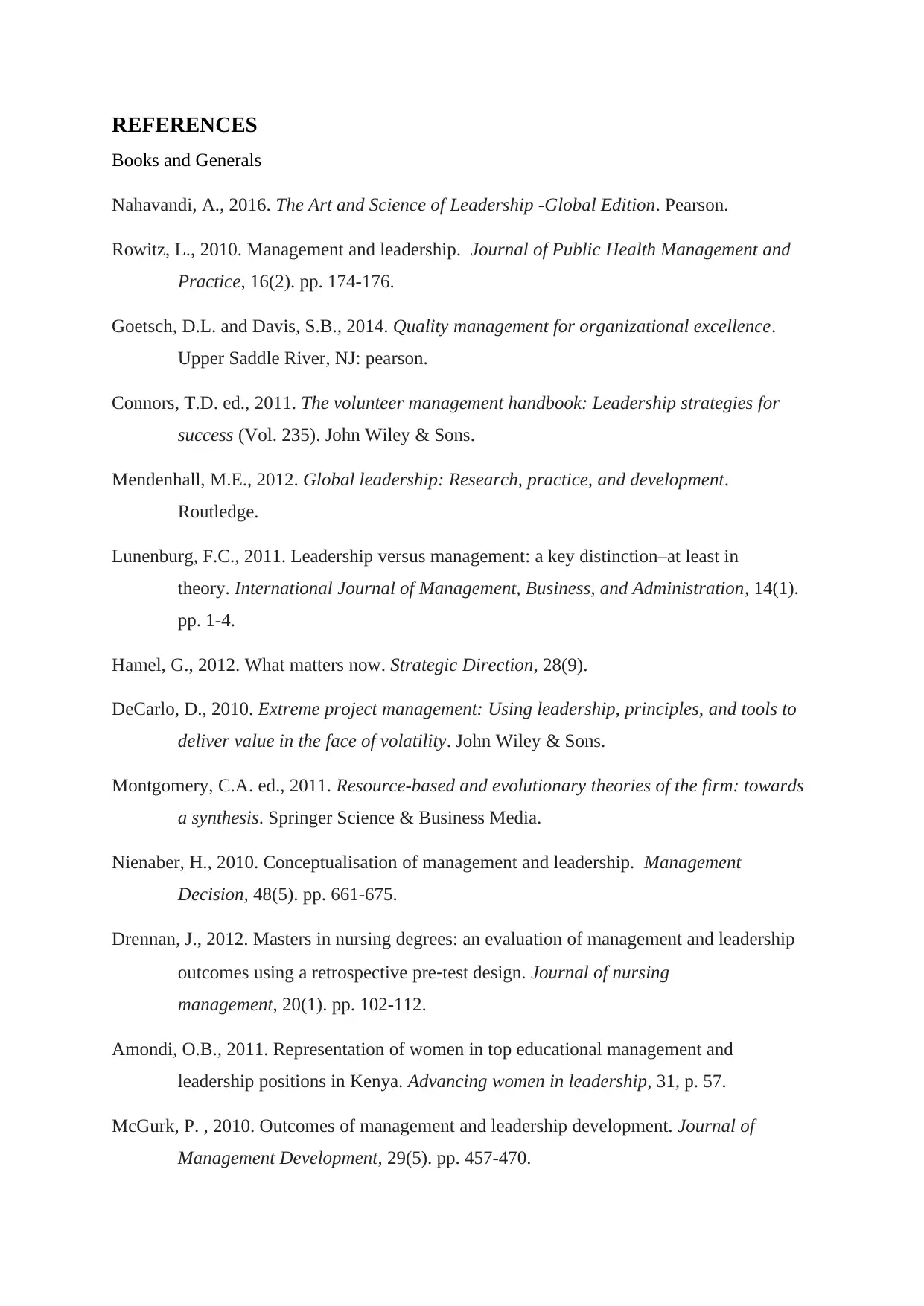
REFERENCES
Books and Generals
Nahavandi, A., 2016. The Art and Science of Leadership -Global Edition. Pearson.
Rowitz, L., 2010. Management and leadership. Journal of Public Health Management and
Practice, 16(2). pp. 174-176.
Goetsch, D.L. and Davis, S.B., 2014. Quality management for organizational excellence.
Upper Saddle River, NJ: pearson.
Connors, T.D. ed., 2011. The volunteer management handbook: Leadership strategies for
success (Vol. 235). John Wiley & Sons.
Mendenhall, M.E., 2012. Global leadership: Research, practice, and development.
Routledge.
Lunenburg, F.C., 2011. Leadership versus management: a key distinction–at least in
theory. International Journal of Management, Business, and Administration, 14(1).
pp. 1-4.
Hamel, G., 2012. What matters now. Strategic Direction, 28(9).
DeCarlo, D., 2010. Extreme project management: Using leadership, principles, and tools to
deliver value in the face of volatility. John Wiley & Sons.
Montgomery, C.A. ed., 2011. Resource-based and evolutionary theories of the firm: towards
a synthesis. Springer Science & Business Media.
Nienaber, H., 2010. Conceptualisation of management and leadership. Management
Decision, 48(5). pp. 661-675.
Drennan, J., 2012. Masters in nursing degrees: an evaluation of management and leadership
outcomes using a retrospective pre‐test design. Journal of nursing
management, 20(1). pp. 102-112.
Amondi, O.B., 2011. Representation of women in top educational management and
leadership positions in Kenya. Advancing women in leadership, 31, p. 57.
McGurk, P. , 2010. Outcomes of management and leadership development. Journal of
Management Development, 29(5). pp. 457-470.
Books and Generals
Nahavandi, A., 2016. The Art and Science of Leadership -Global Edition. Pearson.
Rowitz, L., 2010. Management and leadership. Journal of Public Health Management and
Practice, 16(2). pp. 174-176.
Goetsch, D.L. and Davis, S.B., 2014. Quality management for organizational excellence.
Upper Saddle River, NJ: pearson.
Connors, T.D. ed., 2011. The volunteer management handbook: Leadership strategies for
success (Vol. 235). John Wiley & Sons.
Mendenhall, M.E., 2012. Global leadership: Research, practice, and development.
Routledge.
Lunenburg, F.C., 2011. Leadership versus management: a key distinction–at least in
theory. International Journal of Management, Business, and Administration, 14(1).
pp. 1-4.
Hamel, G., 2012. What matters now. Strategic Direction, 28(9).
DeCarlo, D., 2010. Extreme project management: Using leadership, principles, and tools to
deliver value in the face of volatility. John Wiley & Sons.
Montgomery, C.A. ed., 2011. Resource-based and evolutionary theories of the firm: towards
a synthesis. Springer Science & Business Media.
Nienaber, H., 2010. Conceptualisation of management and leadership. Management
Decision, 48(5). pp. 661-675.
Drennan, J., 2012. Masters in nursing degrees: an evaluation of management and leadership
outcomes using a retrospective pre‐test design. Journal of nursing
management, 20(1). pp. 102-112.
Amondi, O.B., 2011. Representation of women in top educational management and
leadership positions in Kenya. Advancing women in leadership, 31, p. 57.
McGurk, P. , 2010. Outcomes of management and leadership development. Journal of
Management Development, 29(5). pp. 457-470.
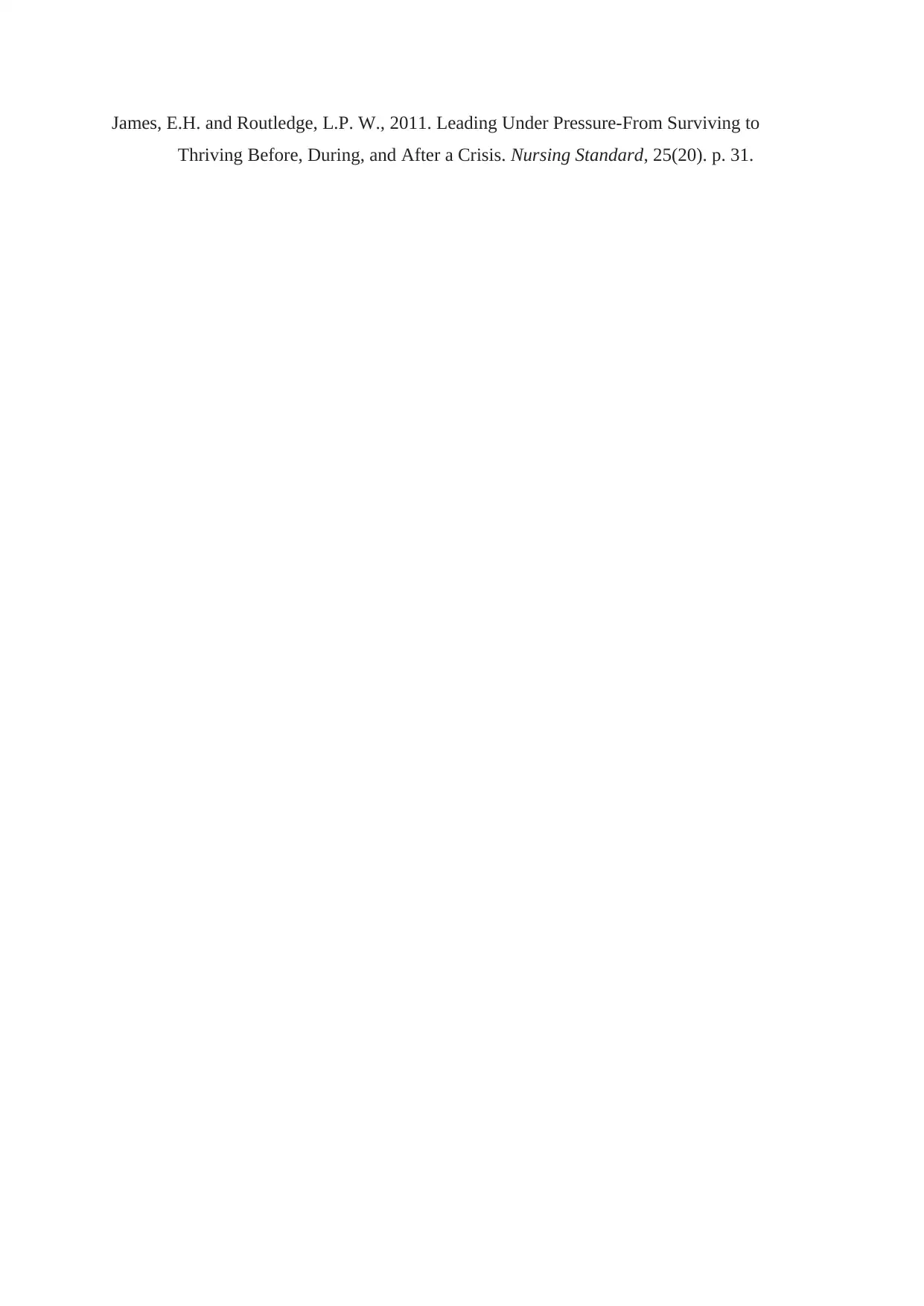
James, E.H. and Routledge, L.P. W., 2011. Leading Under Pressure-From Surviving to
Thriving Before, During, and After a Crisis. Nursing Standard, 25(20). p. 31.
Thriving Before, During, and After a Crisis. Nursing Standard, 25(20). p. 31.

1 out of 13
![[object Object]](/_next/static/media/star-bottom.7253800d.svg)





